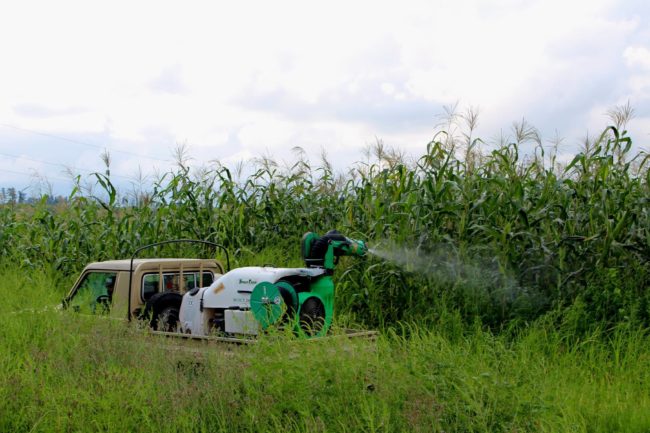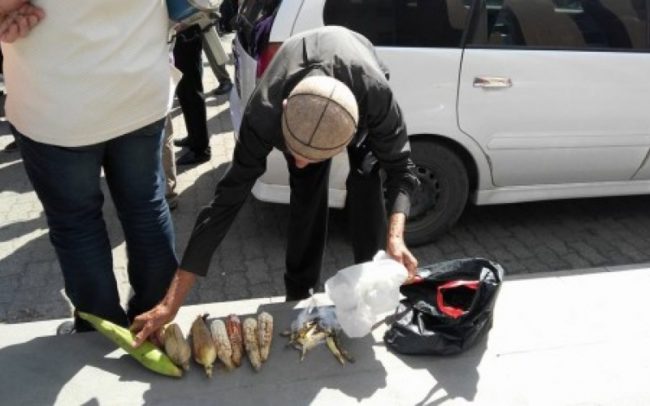

 For over two weeks, people living in western Georgia have been asking the authorities to help them amidst a large-scale invasion of a dangerous agricultural pest. The bug has devastated hazelnut crops which are the main source of income of many farmers in the region.
For over two weeks, people living in western Georgia have been asking the authorities to help them amidst a large-scale invasion of a dangerous agricultural pest. The bug has devastated hazelnut crops which are the main source of income of many farmers in the region.
Brown marmorated stink bug first appeared in Samegrelo (Mingrelia) and Guria in western Georgia in 2015 where it devastated crops of several cultures, particularly hazelnut. Since early September this year, local farmers have been gathering in front of local administration buildings, first to seek support from the local governments, and later to protest against them, claiming that the authorities have failed to help them to protect the crops and have not offered compensation or assistance.
The importance of hazelnut for the local economy
Levan Davitashvili, Georgia’s Agriculture Minister has said that this year the hazelnut harvest might be reduced by 20–30% compared to the last year. According to him, the damage the insect caused has been so immense that it ‘should be grounds for international alarm’.
According to Georgia’s National Food Agency, the bug already caused a loss of ₾50–60 million ($21–24 million) to the hazelnut industry during the 2016 season.
The local economy is largely dependent on hazelnut. The share of hazelnut export amounted to 8.5% of the total volume of Georgia’s exports in 2016, with 27,173 tonnes exported and $179.5 million earned, according to Georgia’s National Statistics Office (Geostat).
Geostat wrote on 19 September that during the first eight months of 2017, the hazelnut export share was only 2.2%, with $36,461 million. This is almost 2.5 times less than the same indicator during the first eight months of 2016 — 6.9%, with $90,642 million.
The insect can devastate other crops as well, such as apples, nectarines, peaches, raspberries, tomatoes, peppers, sunflowers, and maize.
Local protests
On 11 September, tens of local farmers gathered in front of the Samegrelo–Zemo Svaneti regional administration building in Zugdidi, demanding compensation for the damage. They said they would give the authorities time until 18 September to issue an official response whether their demand would be taken into consideration.
Mamuka Tsotseria, the deputy head (gamgebeli) of Zugdidi Municipality told Radio Tavisupleba, RFE/RL’s Georgian bureau that all resources were directed to spraying the affected crops with pesticides and on raising awareness of how to fight the insect. However, Tsotseria said there were no talks of giving compensation.

Georgian Prime Minister Giorgi Kvirikashvili, while presenting candidates for the upcoming local elections on 16 September, said in Zugdidi that ‘fighting the problem is a long-term process and needs a complex approach’.
According to Zugdidi-based media outlet Livepress, the protesters gathered again on 18 September and brought destroyed fruit, vegetables, and hazelnuts to show the authorities that they have lost their source of income. Some of them have sworn to go on a hunger strike if their demands are not met.
How to fight the bug?
In March 2017, Georgia launched a state programme to fight against the stink bug on various levels. The major goal of the programme was to raise awareness of local communities how to fight the insect in the long term.
Georgia’s National Food Agency (NFA), which runs the programme, has advised farmers to ‘collect and mechanically destroy’ the bugs while they are overwintering. ‘Destroying one stink bug during their wintering period equates to destroying 200 of them for the next season’.
As a more short-term step, the NFA has set up hotlines for farmers in Samegrelo, Guria, and Imereti in case they find the bug. The agency has also started applying pesticides to the affected areas with a help of a helicopter in Abasha municipality on 13 September.
On 19 September, almost a week after the aviation was engaged in the works, the NFA said more than 7,000 hectares of land was processed.
According to the NFA, the bug so far has not spread to the eastern parts of the country, and their goal is to prevent this. Radio Tavisupleba quoted Zurab Lipartia, deputy head of the NFA as saying that the bug is attracted by crops widespread in eastern Georgia, such as apples, peaches, vines, and pears. ‘This means that if the bug spreads to eastern Georgia, it will be a huge problem’, Lipartia said.
However, as farmers in eastern Georgia apply pesticides to their crops at least nine times a season, the bug should supposedly die, Lipartia hoped. ‘There are separate cases of crop devastation from the bug in eastern Georgia, but fortunately, it’s not as widespread as in western Georgia’.
Abkhazian struggle
The stink bug has reportedly become Abkhazia’s severe problem as well. The Georgian government considers Abkhazia to be a part of Georgia’s territory under Russian occupation and doesn’t exercise control over the republic.
Ekho Kavkaza quoted Kan Taniya, Abkhazian Deputy Minister of Foreign Affairs, as saying that the bug has spread to roughly 80% of Abkhazia and is prevalent in Sukhumi (Sukhum) and Gali (Gal) districts.
‘It is eating up hazelnuts now. It may move on to tangerines. Without tangerines, the Abkhazian economy will struggle. Then it may move to potatoes. They say it has already damaged potatoes somewhere’, Taniya said.
Taniya identified another ecological problem, such as the disappearance of Colchis box trees — a species of slow-growing, endangered evergreen shrubs, and weevil — a beetle, which, according to Tania, has been eating palm trees from the inside.
Taniya said their task is to ‘attract international assistance and international experts so they could tell us the most effective ways to combat both the bug and other parasites’.
‘This is not only an Abkhazian problem, there are similar problems along the Black Sea coast including in Georgia, Turkey and Russia. We will try to attract experts and financial assistance through the Geneva Discussions’, Tania said.
The Geneva International Discussions is an international discussion format launched in October 2008 to address the consequences of the 2008 South Ossetian conflict in Georgia. It is co-chaired by the EU, OSCE, and UN. The next round of the discussions is scheduled for 10–11 October 2017.
For ease of reading, we choose not to use qualifiers such as ‘de facto’, ‘unrecognised’, or ‘partially recognised’ when discussing institutions or political positions within Abkhazia, Nagorno-Karabakh, and South Ossetia. This does not imply a position on their status.









